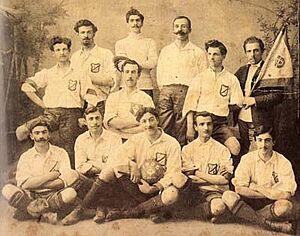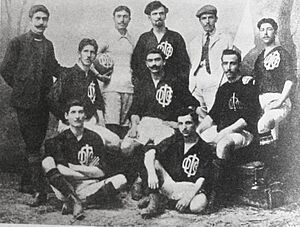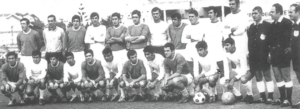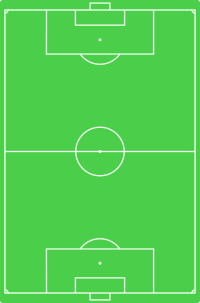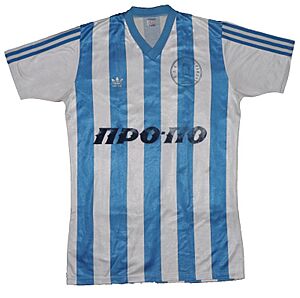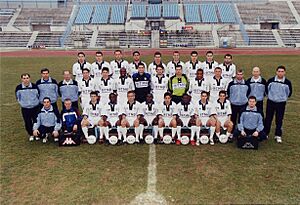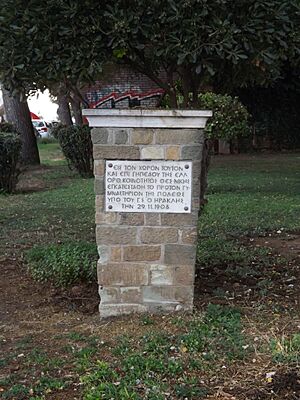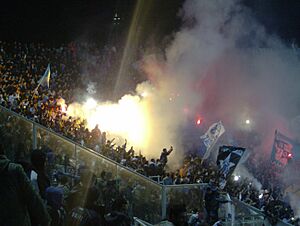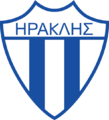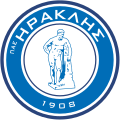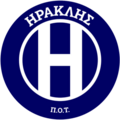Iraklis F.C. (Thessaloniki) facts for kids
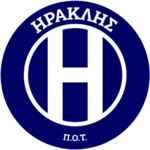 |
||||
| Full name |
|
|||
|---|---|---|---|---|
| Nickname(s) |
|
|||
| Short name | Iraklis | |||
| Founded |
|
|||
| Ground | Kaftanzoglio Stadium | |||
| Capacity | 27,560 | |||
| Owner |
|
|||
| Chairman | Aristotelis Perrakis | |||
| Manager | Babis Tennes | |||
| League | Super League 2 | |||
| 2024–25 | Super League 2, 2nd of 10 | |||
|
||||
Iraklis F.C. is a professional football club from Thessaloniki, Greece. It was started in 1908. The club is part of a bigger sports group called G.S. Iraklis Thessalonikis. They play their home games at Kaftanzoglio Stadium. As of 2025, Iraklis competes in the Super League 2, which is the second-highest football league in Greece.
The main club, G.S. Iraklis Thessalonikis, was founded on November 29, 1908. It is one of the oldest sports clubs in Greece. This is why it's nicknamed "Gireos," meaning "Elder." In 1910, the name "Iraklis" was added. This name honors Heracles, a strong hero from Greek mythology. Because of this, the team is also called "Imitheos," meaning "Demigod." The club's colors are blue and white, just like the flag of Greece.
Iraklis Thessaloniki helped create the Macedonia Football Clubs Association and the Hellenic Football Federation. Before the main Greek league started, Iraklis won the Macedonia Football Clubs Association league five times. The club has played in five Greek Cup finals. They won the Greek Cup once in 1976. This is their only major national trophy. They also won an international trophy, the Balkans Cup, in 1985.
Contents
Club History
Early Days (1899–1912)
The club's story began on July 1, 1899, with a group called Omilos Filomouson. This group was a cultural club for Greeks in Thessaloniki. Its sports part started in 1902. In 1903, they joined with another club called Olympia. Football was new but becoming very popular. So, they decided to create a football team. The first football match for Omilos Filomouson was on April 23, 1905. They won 3–0 against Union Sportive.
Later, Omilos Filomouson had money problems. So, on November 29, 1908, some members started a new sports club. It was called Makedonikos Gymnastikos Syllogos. The Ottoman rulers allowed this new club to operate. The first president was a Greek doctor, Alkiviadis Maltos. The name showed the Greek people's pride in their region, Macedonia.
Because of political changes in 1908, the club had to change its name. In 1910, they chose a new name: Othomanikos Ellinikos Gymnastikos Syllogos Thessalonikis "Iraklis". The name "Iraklis" (Heracles) was added to honor the ancient Greek hero. This new name was officially approved on April 13, 1911.
Becoming a National Club (1912–1959)
After Thessaloniki became part of Greece in 1912, the club was officially recognized. On January 11, 1915, it became Gymnastikos Syllogos Thessalonikis "Iraklis".
Soon after a war in 1914, Iraklis helped organize the first Thessaloniki Football Championship. They won it in January and February 1914. They also won the second championship a year later. In 1914, Iraklis started a youth team for students to learn football.
After World War I, many football clubs started in Thessaloniki. This led to the creation of the Macedonia Football Clubs Association in 1923. Iraklis played in the first championship but lost the final to Aris Thessaloniki. In 1924, Iraklis played its first game against a team from outside Greece. They won 2–1 against SSK Skopje from Yugoslavia. That same year, they played their first game abroad, winning 3–0 against SK Bitola.
In 1926, Iraklis hired Joseph Sveg from Hungary as their manager. He was the first foreign manager in Greece. Under Sveg, Iraklis won the Macedonia Football Clubs Association Championship in 1926–27. They became champions of Macedonia and Thrace.
In the 1933–34 season, Iraklis won the North Group of the Panhellenic Championship. This meant they played in the final against Olympiacos. Iraklis lost both games and did not win the national title.
Iraklis had mixed results in the following years. In 1938–39, they won the Macedonia Football Clubs Association championship again. They also reached the national final but lost to A.E.K.. The next season, they won the Macedonia Football Clubs Association Championship for the second time in a row.
All football games stopped in Greece from 1941 to 1945 due to World War II. After the war, Iraklis often competed with Aris Thessaloniki for the Macedonia F.C.A. Championship. In 1947, Iraklis played in the Greek Cup final but lost to Olympiacos. In the 1950s, Iraklis was one of the top teams in Greece. However, the club faced money problems. In 1957, they reached the Greek Cup final again but lost to Olympiacos.
Professional Football Era (1959–1975)
Iraklis played in the very first season of the Alpha Ethniki (Greece's top league) in 1959–60. They finished 10th. The club's football academy was also started then. In the 1960–61 season, Iraklis finished 8th and had a big 4–0 win against Atromitos Piraeus. They also reached the Greek Cup semi-finals.
Iraklis played in the Inter-Cities Fairs Cup twice but was eliminated early. In the league, they finished 6th in 1961–62, which was a club record at the time. In the rest of the 1960s, Iraklis usually finished in the middle of the league table. In 1965, Kostas Aidiniou joined the team. He became a very important player. In 1968–69, Iraklis won 4–0 against AEL Limassol, matching their biggest win record.
In the 1970–71 season, Iraklis finished 5th, their best position since the Alpha Ethniki began. In that season, a record 45,634 tickets were sold for their 1–0 home win against Panathinaikos. This is still a club record. For the next four seasons, Iraklis stayed in safe mid-table positions. In 1972, Iraklis signed Dimitris Gesios, who would become the club's all-time top scorer in the league. In 1973–74, Iraklis had its biggest Alpha Ethniki win, beating AEL 6–1. In 1974, Iraklis sold its star player, Kostas Aidiniou, to Olympiacos.
The Vasilis Hatzipanagis Era (1975–1990)
On November 22, 1975, Iraklis signed Vasilis Hatzipanagis. He was a Greek player from the Soviet Union. He was later named Greece's Golden Player for the UEFA Jubilee Awards. In the 1975–76 Greek Cup, Iraklis reached the semi-finals and beat Panathinaikos 3–2. They then went on to face Olympiacos in the final.
On June 9, 1976, Iraklis won the Greek Cup after a penalty shootout. The game ended 4–4 after extra time, and Iraklis won 6–5 on penalties. Hatzipanagis scored twice in the final. This was the club's only major national trophy. In the league, Iraklis finished 8th.
In the next season, Iraklis was eliminated from the European Cup Winners' Cup. They struggled in the league, finishing 12th. In the 1978–79 season, Iraklis improved a lot. They finished 6th in the league and had their biggest Alpha Ethniki victory, beating A.S. Rodos 8–1.
The 1979–80 season was the first for fully professional football in Greece. Iraklis finished 8th. A big moment was their 6–0 win against Panathinaikos, which is Panathinaikos's biggest league defeat ever. Iraklis reached the Greek Cup semi-finals and eliminated P.A.O.K.. However, the club's chairman was accused of trying to bribe a P.A.O.K. player. Iraklis played in the Cup final but lost 5–2 to Kastoria.
Because of the bribery accusation, Iraklis was moved down to the second league (Beta Ethniki). Later, the club was found not guilty, but they had already played in Beta Ethniki. In the 1980–81 season, Iraklis won the Beta Ethniki North Group championship. They scored 99 goals and had a record 12–0 win against Edessaikos.
When they returned to the top league, Iraklis finished 6th in 1981–82. In the 1983–84 season, Iraklis finished in third place, which is still their best league position since professional football began. Hatzipanagis scored 12 goals that season.
In the 1984–85 season, Iraklis finished 5th and scored 59 goals, a club record. Hatzipanagis, Lakis Papaioannou, and Sigurður Grétarsson each scored 10 goals. In the same season, Iraklis won its only international trophy, the Balkans Cup. They beat Turkish teams Galatasaray and Ankaragücü. In the final, Iraklis won 5–4 on total goals against Argeș Pitești.
In 1985–86, Iraklis finished 4th and had the best defense in the league. In 1987, 17,000 fans traveled to Athens to support Iraklis in the Greek Cup final. But their team lost 3–1 on penalties to O.F.I.. On November 9, 1990, Vasilis Hatzipanagis retired from football.
Changes and Challenges (1990–2011)
The 1990s were a time of rebuilding for Iraklis. Many older players left or retired. Vasilis Hatzipanagis's retirement in 1990 greatly affected the team. Fans wanted new management because the club president was selling talented players.
In 2000, a businessman named Evangelos Mytilineos bought the team. Even with new players, the 2000–2001 season wasn't as good as hoped. Iraklis finished 5th. They did reach the second round of the UEFA Cup and had a memorable win against 1. FC Kaiserslautern. The next summer, Mytilineos sold a popular striker, Michalis Konstantinou, which upset fans.
In 2003, Evangelos Mytilineos wanted to leave the team. He sold it to Giorgos Spanoudakis for a very small amount because the team had many debts. Spanoudakis made some expensive deals that didn't work out, and the team almost went bankrupt.
In January 2004, Savvas Kofidis, a former player, became the team's manager. In 2005–06, he led Iraklis to a great 4th-place finish. They played exciting football and set a club record of 13 home wins in a row. But the club still had big debts. In 2006, Kofidis resigned. The 2006–07 season was tough, but Iraklis managed to stay in the Super League on the last day.
Financial Troubles and Relegations (2007–2021)
On July 13, 2007, Giorgos Spanoudakis resigned. A group of local business people, led by singer Antonis Remos, took over. They tried to fix the club's money problems.
However, on May 4, 2011, Iraklis Thessaloniki was moved down to the Football League. This happened because they couldn't get a license to play in the Super League. On May 19, 2011, the club was found guilty of using fake documents during player transfers. So, they were automatically placed in last position. This is unusual because Iraklis has never finished in a relegation spot but has been moved down twice. On September 26, 2011, the club lost its professional license and was moved down to the fourth league. Fans protested in Thessaloniki and Athens.
The team played in the fourth league in 2011–12. The club's board discussed joining with another club. On January 3, 2012, G.S. Iraklis Thessalonikis signed a deal with M.A.E. Pontion Katerinis. On January 20, 2012, the merger was approved. The football team was stopped, and M.A.E. Pontion Katerinis changed its name to Athlitiki Enosi Pontion "Iraklis" 1908. They took Iraklis's logo and colors and moved to Kaftanzoglio Stadium.
On September 24, 2012, the new merged club was accepted into the Greek Football League. This was to correct the unfairness against the old Iraklis. The new company was called A.E.P. Iraklis 1908 P.A.E.. This new club uses the old Iraklis crest and colors.
After more talks, Spyros Papathanasakis became the main owner in 2014. In 2017, Iraklis was dissolved as a professional club again due to major money problems. They couldn't play in the Football League and started the season in the third league. The next season, they were promoted back to the Football League. In 2018, the company was renamed A.E.P. Iraklis 1908 Nea P.A.E..
In 2019, Iraklis was moved down from the professional second league to the amateur fourth league. This was due to changes in Greek championships and their financial state. The professional club became unable to form a team.
So, a new football club was formed on September 25, 2019, through the volleyball club of Iraklis. The new club was named Athlitikos Syllogos "Iraklis" 2015. It played in the lowest regional league in Thessaloniki. In 2020, amateur championships were stopped due to the COVID-19 pandemic. Iraklis won the championship, winning all 15 games.
In September 2020, G.S. Iraklis Thessalonikis made a deal with A.S. Iraklis Ampelokipon. In the 2020–21 season, Iraklis played in the third league and finished second. In April 2021, the agreement with A.S. Iraklis Ampelokipon ended.
P.O.T. Iraklis (2021–Present)
On August 2, 2021, G.S. Iraklis Thessalonikis made a new agreement with P.O. Triglias. P.O. Triglias changed its name to Panathlitikos Omilos Triglias "Iraklis" and moved to Kaftanzoglio Stadium. The new company was named P.O.T. Iraklis P.A.E..
In the 2021–22 season, Iraklis played in Super League 2. They finished 7th in their group. In the 2022–23 season, they finished 5th and scored the most goals in the league.
The 2023–24 season started with legal problems. Many players left the team. The team manager also left. Iraklis had to move its football activities to another stadium. They finished 7th in their group.
On September 27, 2023, the club faced a risk of being moved down from the Super League 2. This was due to an old debt. The owner, Stratos Evgeniou, said he couldn't pay it. On October 2, 2023, the main Iraklis club asked fans for financial help. The coach and players also offered to take less money. On October 6, 2023, the fans showed amazing support. In just three days, they collected enough money to pay the debt. This day is a very important moment in the club's history.
In the summer of 2024, Panagiotis Monemvasiotis became a new major investor in the club. Stratos Evgeniou still owns the club. In the 2024–25 season, Iraklis finished 2nd in their Super League 2 group.
Club Ownership
Iraklis has had different owners over the years. Before 1979, the football club was part of the bigger multi-sport club. In 1979, it became a professional company.
From 2000 to 2003, Evangelos Mytilineos owned the club. He later left because he was unhappy with Greek football. Then, Giorgos Spanoudakis took over. The club faced many financial difficulties during this time.
In 2008, Greek singer Antonis Remos, a big fan of Iraklis, became the chairman and later the owner. However, the club continued to have problems. In 2011, Iraklis was moved down from the top league due to financial issues and rule breaking.
After this, new companies were formed to keep the club going. Spyros Papathanasakis became the main owner of A.E.P. Iraklis 1908 in 2014. The club was promoted to the Super League in 2015. But in 2017, it faced more financial problems and was dissolved again. A new committee of legends and fans helped save the club.
In 2018, Tom Papadopoulos became the new main owner of A.E.P. Iraklis 1908 Nea P.A.E. Since 2021, Stratos Evgeniou has been the owner of P.O.T. Iraklis P.A.E., with Panagiotis Monemvasiotis joining as a financier in 2024.
Club Facilities
Stadium
The first home ground of Iraklis was in the center of Thessaloniki. It was built with money from the club's members. But after Thessaloniki became part of Greece, the club lost its ground. A park was built there instead. In 1915, Iraklis rented another area in the city center. They used it from 1919. In the 1930s, the Aristotle University of Thessaloniki tried to take over the field. For almost 20 years, both the club and the university used it. In the 1950s, the university took full ownership to build a square.
On November 6, 1960, Iraklis played its first game at Kaftanzoglio Stadium. They won 2–1. Kaftanzoglio has been Iraklis's home stadium ever since. In 2002–03 and 2003–04, Iraklis used Makedonikos Stadium because Kaftanzoglio was being renovated for the 2004 Summer Olympics. Iraklis also has a training ground and facilities in the Chortatzides area, where the youth teams train. There were plans to build a new 22,000-seat stadium in Mikra, but this has not happened yet.
Training Facility
The Mikra Training Center is in Kalamaria. It is Iraklis Thessaloniki's own training ground. The facilities include three football fields, a gym, a sauna, and a swimming pool. The club's main office building is also there.
Club Supporters
Iraklis Thessaloniki has always had strong support from its fans. Even though football wasn't the most popular sport at first, it quickly became the club's main focus. In the 1970s and 1980s, about 10,000 people came to games. This reached a peak in 1983–84 with an average of 16,559 fans per game. In the 1990s, after Vasilis Hatzipanagis retired, attendance dropped to about 5,000. The lowest attendance was 384 tickets sold for a game against Paniliakos.
Attendance increased a bit after Evangelos Mytilineos bought the club. In 2001–02, the average was 6,790. On January 24, 1971, Iraklis Thessaloniki set the highest attendance record for any Alpha Ethniki football match. There were 45,634 tickets sold for their game against Panathinaikos. In the 1987 Greek Cup final, 17,000 Iraklis fans traveled to Athens.
The most well-known supporters' club is Aftonomi Thira 10 (meaning Autonomous Gate 10). This fan club has 15 branches in Northern Greece. They are known for being against racism and participate in the Ultras Antiracist Festival. They also publish a magazine and hold an annual festival. Other smaller fan clubs include SFISE, Blue Boys, A.P.A.T.S.I., and Iraklis Fan Club of Athens.
Iraklis Thessaloniki fans have connections with supporters of other clubs. These include Mainz (Germany), Rayo Vallecano (Spain), Zemun (Serbia), and Buducnost Podgorica (Montenegro). These clubs showed support during Iraklis fans' protests in 2011.
Fans also feel a connection with all clubs named "Heracles" around the world. Especially with the Spanish club Hércules. Since 2003, fans of both teams have become friends online. There is even a Hércules supporters' club named "Iraklis" to honor this friendship.
Club Crest and Colors
Crests
Iraklis's crest has changed over time. The crest of the main multi-sport club, G.S. Iraklis Thessalonikis, shows the hero Heracles. He is resting and leaning on his club. This image is inspired by an ancient statue called Farnese Hercules. The club's simple logo is the Greek letter "Η" (Eta), which is the first letter of "Iraklis." It is surrounded by a circle. For its 100th birthday in 2008–09, the club used a special logo.
G.S. Iraklis Thessalonikis
P.O.T. Iraklis
Colors
Throughout its history, Iraklis's colors have always been blue (or cyan) and white. These colors represent the flag of Greece. This is because G.S. Iraklis Thessalonikis was founded when Thessaloniki was part of the Ottoman Empire. In Greece, the team is known as "Kianolefkoi," meaning "Cyan-Whites." Iraklis's away colors were usually white or orange. The traditional Iraklis kit has blue and white stripes. However, over the years, it has often changed to all blue, all white, or other designs.
Kit Evolution
G.S. Iraklis Thessalonikis
Home Kit
|
1983–84
|
1984–85
|
1999–2000
|
Away Kit
|
1984–85
|
A.E.P. Iraklis 1908
Home Kit
|
2012–13
|
2014–15
|
2015–16
|
2018–19
|
Away Kit
|
2012–13
|
2015–16
|
P.O.T. Iraklis
Home Kit
|
2021–22
|
2022–23
|
2023–24
|
2024–25
|
Away Kit
|
2024–25
|
Third Kit
|
2024–25
|
Current Players and Staff
Current Squad
|
|
Coaching Staff
The current head coach of Iraklis is Babis Tennes. He leads the team's training and strategies. The team also has assistant coaches, a goalkeeping coach, and a fitness coach to help the players stay in top shape.
Club Records
Biggest Wins
- Biggest win overall: 14–1 against Enosi Charilaou in the 1959–60 Greek Cup.
- Biggest away win: 8–1 against Apollon Krya Vrysi in the 1993–94 Greek Cup.
- Biggest league win: 12–0 against Edessaikos in the 1980–81 Beta Ethniki (second division).
- Biggest top league win: 8–1 against A.E.K. in 1930–31 and 8–1 against Rodos in 1978–79.
Highest Attendances
Iraklis has had some very large crowds at its games:
| Date | Stadium | Opponent | Attendance | Source |
|---|---|---|---|---|
| 24 January 1971 | Kaftanzoglio Stadium | Panathinaikos | 45,634 | |
| 12 February 1984 | Kaftanzoglio Stadium | Panathinaikos | 41,700 | |
| 13 February 1972 | Kaftanzoglio Stadium | P.A.O.K. | 38,752 | |
| 23 May 1982 | Kaftanzoglio Stadium | Panathinaikos | 37,297 | |
| 23 September 1973 | Kaftanzoglio Stadium | Panathinaikos | 37,169 |
Club Achievements
Regional Titles
- Thessaloniki Championship
- Winners (2): 1914, 1915
- Macedonia F.C.A. Championship
- Winners (5): 1926–27, 1938–39, 1939–40, 1950–51, 1951–52
- Macedonia F.C.A. Third Division
- Winners (1): 2019–20
National Titles
- Second National Division
- Champions (1): 1980–81
- Third National Division
- Champions (1): 2017–18
- Greek Cup
- Winners (1): 1975–76
International Titles
- Balkans Cup
- Winners (1): 1984–85
See also
 In Spanish: Iraklis de Tesalónica para niños
In Spanish: Iraklis de Tesalónica para niños
- G.S. Iraklis Thessaloniki
- G.S. Iraklis Thessaloniki (Men's Basketball)
- G.S. Iraklis Thessaloniki (men's volleyball)


